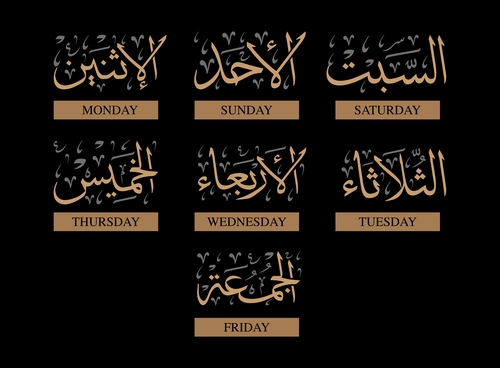A Simple Way to Learn Days of the Week in Arabic

Learning the days of the week in Arabic can be both fun and rewarding. The names of the days are deeply rooted in the Arabic language, culture, and Islamic tradition. Understanding these names not only helps with everyday conversation but also offers insight into the structure of the Arabic language and its cultural connections. Arabic is spoken by millions of people around the world, and grasping basic elements like the days of the week makes the language more accessible. Whether you are planning a trip to an Arabic-speaking country, learning the language for professional reasons, or just broadening your linguistic horizons, this guide will provide a simple way to learn and remember the days of the week in Arabic.
Arabic Names for Days of the Week
These Arabic names are essential for basic conversations, such as planning events, scheduling appointments, or even understanding the rhythm of Islamic culture and religious practices.
The Arabic names for the days of the week are as follows:
-
Friday – الجمعة /al-ĵumuʿah/ or /al-ĵumʿah/
-
Saturday – السبت /as-sabt/
-
Sunday – الأحد /al-`aħad/
-
Monday – الاثنين /al-ithnayn/
-
Tuesday – الثلاثاء /ath-thulāthā'/
-
Wednesday – الأربعاء /al-`arbiʿā`/
-
Thursday – الخميس /al-khamīs/
As you may have seen, Friday marks the start of the Arabic week and Thursday marks its conclusion. The European order, which starts on Sunday and concludes on Saturday, is not the same as the Islamic one.
Origins and Meaning Behind the Days' Names
Interestingly, the days of the week in Arabic derive their names from a mixture of religious significance and a logical numerical pattern.

The first two days are unique in their significance:
-
Friday – الجمعة /al-ĵumuʿah/ or /al-ĵumʿah/: This day holds religious importance in Islam, as Friday is the day of congregational prayer for Muslims. The word "Jumuʿah" refers to gathering or congregation.
-
Saturday – السبت /as-sabt/: The word "Sabt" means rest, drawing connections to ancient traditions where the seventh day was a day of rest.
The remaining five days of the week correspond to ordinal numbers. For instance:
-
Sunday – الأحد /al-`aħad/: The word “al-`aħad” translates to “the first” or “one,” signifying that it was the first day of the week.
-
Monday – الاثنين /al-ithnayn/: "al-ithnayn" comes from the number two, marking it as the second day of the week.
-
Tuesday – الثلاثاء /ath-thulāthā'/: Derived from “three” (thalāth), Tuesday was the third day of the week.
-
Wednesday – الأربعاء /al-`arbiʿā`/: This comes from the number four (arba‘a), making it the fourth day of the week.
-
Thursday – الخميس /al-khamīs/: The word “khamīs” relates to the number five (khamsa), the fifth day of the week.
Connection to Numbers and Tradition
As seen from the names of the days, the remaining five days (after Friday and Saturday) are directly linked to numbers. This makes learning the days of the week in Arabic relatively simple, especially if you are familiar with Arabic numbers. The logical progression from "al-ahad" (derived from the number one) to "al-khamis" (derived from the number five) allows learners to group these five days easily. Friday and Saturday stand out due to their cultural and religious significance, providing a mnemonic anchor for these days.
How to Pronounce the Days of the Week
Correct pronunciation of the days of the week in Arabic can be a bit challenging for beginners, especially because of some unique Arabic sounds that don’t exist in English. Here's a brief pronunciation guide:
-
Friday: Pronounced as /al-ĵumuʿah/ or /al-ĵumʿah/, where the "ĵ" sounds almost like the English "j," but is not fricative voice.
-
Saturday: Pronounced as " as-sabt," where the "s" is sharp.
-
Sunday: Pronounced as /al-`aħad/, where the symbol (`) indicates the glottal stop called Hamzah in Arabic with a slight emphasis on the "ħ" sound, which is a common fricative voiceless guttural sound in Arabic.
-
Monday: Pronounced as /al-ithnayn/, where the "th" is soft, similar to the sound in the English word "thin."
-
Tuesday: Pronounced as /ath-thulāthā'/ with the "th" sound being soft.
-
Wednesday: Pronounced as /al-`arbiʿā`/, where the symbol (`) indicates the glottal stop called Hamzah in Arabic, while the symbol (ʿ) indicates the fricative voiced guttural sound of the Arabic letter called (‘ain).
-
Thursday: Pronounced as /al-khamīs/ with a hard "kh" sound, similar to the Scottish "loch."
Phonetic Transcriptions and Audio Resources
Numerous websites include audio materials and phonetic transcriptions to make sure you pronounce the words correctly.
Below, you can watch our video with a native Arabic speaker outlining the days of the week in Arabic:
DAYS OF THE WEEK By Madinah Arabic

Learn Arabic vocabulary: Episode 1. In this series we will learn Arabic Word Families.
You may also see a children's song about the days of the week in Arabic below:
Days of the week by Toyor-l-Jannah

An Arabic song about the days of the week without music - by toyorbabytv
Appearance of Days of the Week in the Quran
While the specific names of the days of the week, as we know them today, are not frequently mentioned in the Quran, the concept of time, days, and creation is very prominent. The Quran discusses the six days of creation, e.g.:
" وَلَقَدْ خَلَقْنَا السَّمَاوَاتِ وَالْأَرْضَ وَمَا بَيْنَهُمَا فِي سِتَّةِ أَيَّامٍ وَمَا مَسَّنَا مِن لُّغُوبٍ "
(50:38) We created the heavens and the earth and all that is between them in six days, and weariness did not even touch Us.
Also, the Qur’an mentioned Friday (Yawm ul-ĵumuʿah,) which is a day of great importance, as highlighted in Surah Al-Jumu'ah:
" يَا أَيُّهَا الَّذِينَ آمَنُوا إِذَا نُودِيَ لِلصَّلَاةِ مِن يَوْمِ الْجُمُعَةِ فَاسْعَوْا إِلَىٰ ذِكْرِ اللَّهِ وَذَرُوا الْبَيْعَ ۚ ذَٰلِكُمْ خَيْرٌ لَّكُمْ إِن كُنتُمْ تَعْلَمُونَ "
(62:9) Believers, when the call for Prayer is made on Friday, hasten to the remembrance of Allah and give up all trading. That is better for you, if you only knew.
This day is associated with the weekly congregational prayer, emphasizing the importance of gathering and remembrance of Allah. The Arabic language and Islamic tradition intertwine with the spiritual significance of time, days, and weekly routines.
Tips for Learning and Memorizing the Days
Learning and memorizing the days of the week in Arabic can be a fun process if you approach it with engaging methods. Here are some tips to help:
-
Use Flashcards: Create flashcards with the Arabic name on one side and the English translation on the other. This helps reinforce both recognition and recall.
-
Practice with Songs: Many learners find that songs aid memorization. Try listening many times to the above-mentioned children's song that incorporates the days of the week. Repetition through melody can speed up memorization.
-
Daily Practice: Try to integrate the days of the week into your daily routine. For example, when looking at a calendar, recite the days of the week in Arabic.
-
Language Exchange: Practice with native speakers or language partners. Engaging with others will improve your fluency and recall.
Flashcards, Songs, and Practice Methods
Flashcards are one of the most effective tools for memorizing vocabulary. You can either make physical flashcards or use apps like Anki or Quizlet. These apps allow you to test yourself repeatedly, strengthening your memory retention.
Songs are another powerful tool. You can find many simple Arabic songs for children that feature the days of the week. Music and repetition can help anchor the words in your mind in a fun and effortless way.
Lastly, immersing yourself in daily practice is key. Use apps, online quizzes, or even set reminders on your phone in Arabic. The more you expose yourself to the days of the week in real-life contexts, the easier they will become to memorize.
Conclusion
Learning the days of the week in Arabic is a straightforward and rewarding endeavor. With their connections to numbers, Islamic tradition, and the Arabic language, these names offer a glimpse into the rich cultural and linguistic heritage of the Arabic-speaking world. By using tools like phonetic guides, audio resources, flashcards, and songs, you’ll master the days of the week in no time. Engaging with these daily words will also bring you closer to understanding Arabic-speaking cultures and their rich linguistic traditions.
Please follow Madinah Arabic, keep practicing and enjoy learning Arabic.
Explore our comprehensive vocabulary lists to expand your word bank and unlock new ways to express yourself. And for those seeking a more personalized approach, Madinah Arabic also offers one-on-one Arabic classes .
